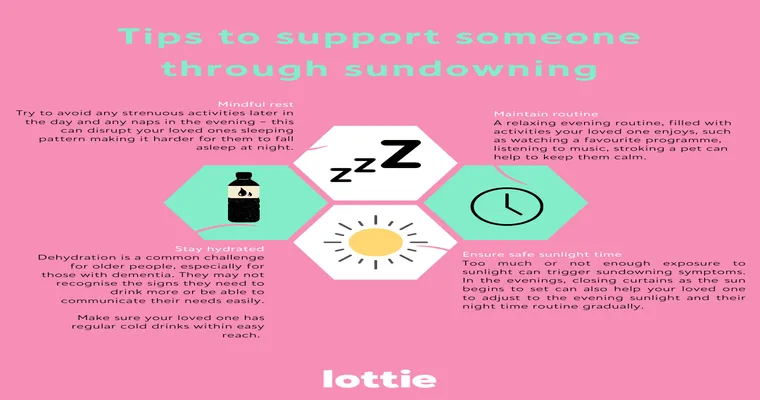Sundowning can be a challenging experience for both caregivers and individuals experiencing it. This phenomenon often occurs in people with "dementia", particularly in the late afternoon or evening, leading to increased confusion, agitation, and anxiety. To effectively manage these symptoms, it is crucial to establish a "daily care routine" that promotes a sense of security and calm. Here are some strategies to help create an effective routine for coping with sundowning.
Understanding Sundowning
Before devising a daily care routine, it is essential to understand what "sundowning" entails. This term refers to a pattern of increased confusion and behavioral issues that many individuals with dementia experience as daylight fades. Symptoms may include restlessness, irritability, and hallucinations. Recognizing these signs allows caregivers to anticipate changes and respond proactively.
Establishing a Consistent Schedule
One of the most effective methods for managing sundowning is to maintain a "consistent daily schedule". A well-structured routine can help create familiarity, which reduces anxiety and confusion. Here are some key components to consider when creating your schedule:
"Regular Wake-Up Time": Start the day at the same time each morning to establish a predictable rhythm.
"Meal Times": Serve meals at consistent times, ensuring they are nutritious and balanced to support overall health.
"Activity Blocks": Incorporate periods of physical activity, mental stimulation, and rest throughout the day to promote engagement and reduce fatigue.
Incorporating Calming Activities
As the day progresses, it is essential to incorporate calming activities into the routine. These activities can help ease the transition into the evening and reduce the likelihood of sundowning symptoms. Consider the following:
"Gentle Exercise": Encourage light exercises, such as walking or stretching, during the late afternoon to help release pent-up energy.
"Relaxation Techniques": Introduce relaxation methods such as deep breathing, meditation, or gentle music in the hour leading up to evening.
"Soothing Environment": Create a calming atmosphere by dimming lights and reducing noise levels in the home to signal winding down.
Engaging with Meaningful Activities
Engagement in meaningful activities throughout the day can help maintain focus and reduce the chances of agitation during the evening. Consider these options:
"Hobbies": Encourage participation in hobbies that the individual enjoys, such as gardening, painting, or crafting.
"Social Interaction": Facilitate social interactions with family and friends, as meaningful conversations can provide comfort and security.
"Memory Activities": Engage in memory-enhancing activities, such as looking through photo albums or listening to familiar music, to evoke positive memories.
Preparing for Bedtime
The bedtime routine is just as important as the daytime schedule. Establishing a calming evening routine can significantly impact the quality of sleep and reduce the effects of sundowning. Here are some tips:
"Consistent Bedtime": Aim for a consistent bedtime to help regulate the sleep-wake cycle.
"Wind Down Period": Allow for a wind-down period before sleep that includes calming activities, such as reading or gentle conversation.
"Comfortable Sleep Environment": Ensure the bedroom is conducive to sleep, with comfortable bedding, appropriate room temperature, and minimal distractions.
Monitoring and Adjusting the Routine
Lastly, it is important to regularly monitor the effectiveness of the daily care routine and make adjustments as needed. Each individual is unique, and what works for one person may not work for another. Keep track of behaviors, preferences, and responses to different activities, and be flexible in modifying the routine to better suit the individual's needs.
Conclusion
Coping with sundowning is a multifaceted challenge that requires patience and understanding. By devising a thoughtful daily care routine that includes consistent scheduling, calming activities, meaningful engagement, and a soothing bedtime ritual, caregivers can significantly improve the quality of life for individuals experiencing sundowning. Remember, the key is to create a sense of security and predictability, which can help mitigate the symptoms associated with this condition.





